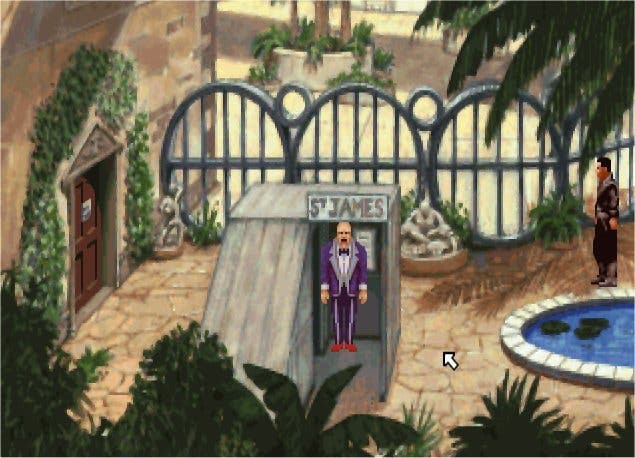Beneath A Steel Sky - Remastered
Charles Cecil on resurrecting the classic adventure.
Dave Cummins, who, alongside Cecil, worked on Lure of the Temptress and Revolution's later hit, Broken Sword, wrote the dialogue for the game. "The tone of our early games was born from a tension between Dave and I. He wanted to be more flippant with dialogue, while I wanted to be more serious. That was always our vision, to find the middle ground between Sierra's ridiculously earnest stories and the slapstick comedy of the LucasArts titles but I think our personalities and approaches emphasized the tension."
Set in an Australia, BASS' story and setting is one of the key reasons for the game's loyal and vociferous fanbase. But the scenario was born from a simple twist on convention: "We liked the idea of reversing the natural order of cities, whereby the higher you are the more status you have. Our concept was that, in a dystopian society were pollution rises, you'd have the richest people living in the lowest areas as, the higher you rise, the more scummy the environment became. Of course, at the time we all loved Blade Runner and Alien and Terminator, the three really big science-fiction films of the era, and they were a big influence."
The game cost about £40,000 to make, a huge amount of money for Cecil at the time, whose first games at Arctic Software had cost around £200 a title. However, just as the game was entering its final stages, Mirrorsoft's owner, Robert Maxwell, died in a yachting accident. Almost overnight the powerhouse publisher went into administration with most of the staff either transferring to Acclaim or Virgin. Nevertheless, the game sold extremely well at retail, managing between 3-400,000 copies, almost all of which were from Europe. For Cecil, it was reward for what had been a difficult development.

"I wasn't particularly realistic about the scope of the game," he admits. "I'm a bit of an autocrat. I believe you ideally have one person driving the vision and that, if you make a mistake, you go back and change it. You make the best decision you can at the start but as the game progresses you have to be willing to go back and change things. Servicing those changes was hard work at times. But you know, videogames are generally just a bitch to finish. BASS wasn't particularly unique in that regard. I'm immensely proud of what we achieved."
BASS' re-release on iPhone segues neatly with the general resurgence of the point-and-click adventure. But for Cecil, the renaissance is due to more than mere nostalgia; its impetus is technological. "I think the resurgence is down to the fact that the hardware spec of these smaller devices is forcing developers back to basics, to push the processor and to make the most of the graphics; we don't have the benefit of gigabytes of RAM. I see the market really diverging between these hundred million dollar developed games, and much simpler games that require the skills that we had back in the eighties."
So has the widening of technical boundaries brought with it a more lazy style of game development? "No, not at all," he says. "You just have more diverse types of game. Technology always opens up new possibilities, but limitations provide helpful constraints, forcing you to innovate within the boundaries. Revolution was formed in 1990 with me wanting to go back to those early days, where teams were small and boundaries were tight. But here today, with the iPhone and Flash platforms it feels like that time again. The difference is that we're now armed with 25 years of game development experience. As such, I hope we can grasp those opportunities in a way that we were unable to the first time."
Beneath A Steel Sky - Remastered is due out for iPhone and iPod Touch this autumn, and may also appear on other formats.

